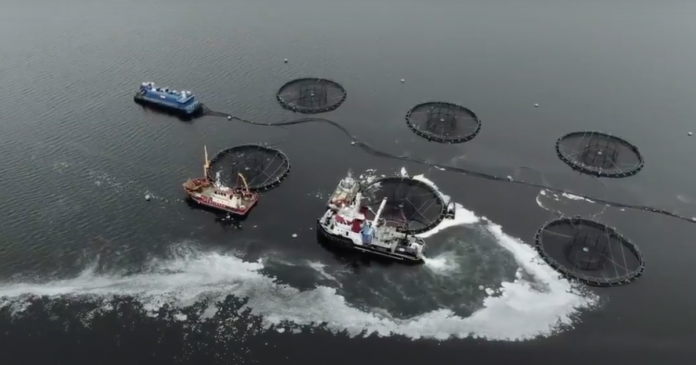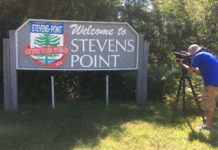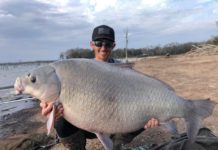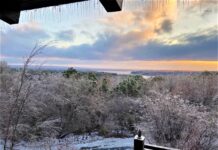I’ve always loved the sea: it’s the backdrop to some of my happiest childhood memories, it’s the reason I studied marine biology at university and it’s why I learned to freedive as an adult.
I’ve swum with sharks, dolphin, turtles, sea-lions and countless, shimmering shoals of mesmerising fish, and been on several life-changing ecological expeditions to chart fish, coral and seaweed.
I first wanted to head to the bays off Scotland when I discovered you could find shoals of the world’s second-largest fish, the basking shark, there. To be able to see a wild creature this exotic on our doorstep would have been reason enough to go.
Decline
Slowly, however, another, more pressing, reason emerged: as, over the course of numerous conversations down the years with my huntin’, fishin’, and shootin’ stepfather, I’ve begun to realise the great threat posed to Scotland’s vast, pristine and fragile coastal ecosystem—of which the basking sharks are just one dramatic part.
For years my stepfather and his fly-fishing friends have been some of the only real frontline witnesses to near-catastrophic declines in the Scotland’s age-old and rightly legendary salmon runs.
A great deal of research shows that these declines are directly attributable to the rise of the salmon-farming industry that is rapidly expanding thanks to consumer demand for this aspirational ‘staple’.
For aeons, salmon have migrated thousands of miles before returning to their Scottish rivers to spawn. But increasingly, on the last legs of their epic pilgrimages back to their ancestral breeding grounds, the wild fish have to swim past cages imprisoning mass-produced salmon.
Held at unnaturally high density, these “tortured animals” are plagued by parasitic sea lice which eat the farmed fish alive. As the wild fish swim by, they too are infected, and go on to suffer the same grisly fate.
For years I brushed off my step-father’s requests to boycott farmed salmon, having grown fond of this beautifully-marketed, ‘healthy’ and ubiquitous foodstuff.
Harm
But recently the fish’s plight has grown harder to ignore.
First, I watched Artifishal, a film about the demise of North American wild salmon made by clothing brand Patagonia. Then I started to notice stories of Scottish salmon appearing in the news with increasing regularity: a photographer went on The One Show to reveal his discovery of vast mass graves of dead fish, then came a slew of stories pointing out how much higher the mortality rates are on Scottish sea farms than those tolerated on land.
Big charities such as the RSPCA became mired in controversy after revelations that they had certified as responsible salmon-farms that shoot wild seals. David Attenborough himself even sounded the alarm: warning that salmon farming risked wild salmon’s extinction.
Meanwhile, in my work as editor of online ecological news platform – Ecohustler – more and more journalists were asking me to publish articles drawing attention to the salmon situation; and probably the final straw for me came when the world’s largest salmon farming company, Mowi, responded with legal threats to an extremely well-researched article I published linking the company with a catalogue of environmental harms.
While our fledgling company lacked the funds to fight the case in the courts, I vowed to regroup and get back into the fight more comprehensively as soon as I could.
Crime
Enter Ruby Reed: yoga teacher, freediver, and environmental activist. Ruby runs, among other things, an inspirational online platform inspiring green behaviour-change called Eco Resolution that’s backed by everyone from Cara Delevigne to Kim Kardashian. She is charismatic, and every inch as informed and incensed as I am about the lack of regulation over Scottish salmon farming—plus she can freedive to double the depth that I can manage.
As lockdown lifted, she and I, plus a couple of filmmakers, drove north to embark on a breathtaking odyssey to explore the issue for ourselves, with support from the marine charity Global Ocean.
Tragically, we discovered that the situation was even worse than the reports we’d studied in preparation for the trip.
85-year-old Allen Berry, a veteran campaigner, went so far as to describe the salmon industry’s unfettered expansion around the coast as “organised crime”. No other business in Scotland, he argued, even came close to polluting on the same scale.
John Aitchison, a BBC cameraman who has worked on many of the BBC’s wildlife series, called for the cages to be urgently contained or moved onto land, describing the industry as dirty and destructive.
Nightmarish
David Ainsley, who runs a whale-search and wildlife-watching boat trip company Sea Life Adventures from Oban, on the west coast, told us how the acoustic devices which factories routinely attach to salmon cages to deter seals traumatise and scare off other local creatures such as whales and dolphin.
In fact, almost everyone we spoke to on the coast seemed livid about the impacts of salmon farming, but, since the Scottish government defends its support for the sector on grounds of job-creation (around 2,000 people are directly employed on farms and in raising smolts), Ruby and I tried to track down pioneers of alternative businesses that might provide employment opportunities in coastal zones but didn’t risk the extinction of a fish species or carry such a high environmental cost.
We met totally inspiring people breathing new life into ancient, artisan, sustainable trades such as shellfish farming, and such as the oyster-bed regeneration project Seawilding, and were told that seaweed farming could provide a pathway not only to jobs but could also capture carbon and boost marine wildlife.
Understandably, we couldn’t convince any fish farm workers to go on the record for our film, but two young men employed on one salmon farm were prepared to speak to us on the condition of anonymity.
They described truly nightmarish scenes: the entire seafloor beneath the cages is dead, they told us. Above which lies a layer of deceased, diseased and deformed fish which sometimes float up through the water column that the live farmed fish are swimming in. At the surface, workers are tasked with reaching in to scoop out carcasses, which invariably dissolve in their hands and leach out into the water of once-pristine lochs.
Dirty
Finally, it was time to see the farms up close with our own eyes, escorted, in our small sailboat, by activist Don Staniford of Scottish Salmon Watch, who has bravely chronicled the devastation the farms wreak despite constant abuse and legal threats from the salmon corporations.
The cages we saw, typical of the kind being rolled out on Scotland’s west coast and in the Hebrides and Northern Isles, are giant, ugly industrial constructions that seem totally out of place in the picturesque Scottish landscape. As we got closer, we saw animals leaping out of the water, probably attempting to dislodge sea lice.
I kitted up, got into position, and, fighting back nerves, slipped into the water and swam to the edge of the cage. Underwater, the immensity of the structures was overwhelming and disorientating. I looked down dirty lines stretching into the polluted depths.
Peering through the nets I recoiled at the sight of vast numbers of animals swimming in listless circles. I tried to calm myself to dive down. As I did I heard warning shouts from our boat.
The farm was sending a tugboat round which my friends worried they might try to ram me with. I did my best to get underwater to document what I could. Our footage corroborated what others have filmed repeatedly in this and other places – dirty, diseased animals suffering slowly in polluted waters.
Scale
I crawled back onto the boat shaking and angry that my swim in open Scottish waters should be cut short with a threat of intimidation. It was very clear the people running these operations do not want visitors.
My surprise turned to alarm when we reached the shore and were apprehended by police. Despite not breaking any laws we were told to back off and not visit any more salmon-factory farms. Don recorded the whole incident and has since filed a complaint. Apparently, it’s not unusual for Scottish police to act as private security guards for the farmed salmon corporations.
While some may criticise Ruby and I for crossing the border to tackle a subject as Scottish as salmon, the truth is that this is an international industry: both in production and in consumption. Farmed salmon is one of the most commonly bought fish in Britain, but how many of us know the harm that is being done?
The Scottish salmon industry currently uses roughly the same quantity of wild-caught fish to feed its salmon as is purchased by the entire adult population of the UK in one year. To raise a single adult fish in a cage requires the capture and slaughter of up to 200 wild caught fish, depriving those in lands far away of much-needed, local sources of protein.
Salmon is both Scotland’s and the UK’s largest food export, so informing the world’s consumers about the unfettered rise of this toxic industry is urgent and important.
Movement
‘Activism,’ said Alice Walker, ‘is my rent for living on the planet.’ I love the ocean, and cannot stand by and just watch while we drive yet another miraculous and irreplaceable species of wildlife into extinction for nothing more than a fast, off-shore buck and a ‘easy’ slab of protein on our plates.
There are other, sustainable proteins for us to eat, and there are other, sustainable livelihoods to be made on the coasts of Scotland: our interviews prove it.
The faster we reign in the practices the factory farming sector visits on fish both farmed and wild and the fragile ecosystems they swim in, the faster these alternatives will emerge.
I have vowed to never again eat factory-farmed food, especially farmed salmon, and I am joining the movement calling for these businesses to be properly regulated so they no longer release any sea lice, farmed fish or pollution.
This Author
Matt Mellen is a communicator and strategist specialising in movement building, public affairs and environmental campaigns. He founded and edits EcoHustler Online Magazine.
Credit: Source link































